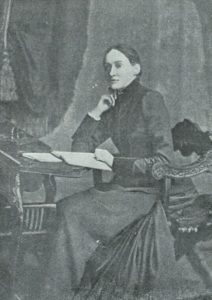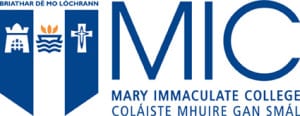Mining the Works of Irish Women Writers, Primary Sources in Archival Collections
Kathleen Williams
As researchers, particularly those exploring Irish women’s writings know, challenges abound! Just as many of the works of Irish women writers have been hidden, so have, or indeed, still are, the primary sources that would foster greater understanding of the women and their work.
Work to create a list of archives for the Irish Women Writers (1880 – 1920) Network website, may lead one to believe that the challenges are overwhelming. A selective list of some of the difficulties involved in exploration of women falling into this category and timeframe includes:
- Many of the women were not well-known even in their own era; their works in many cases were undervalued; hence, their personal or professional papers unimportant and not collected or archived.
- The women, in many cases, are to be found under multiple names: maiden, married, adopted pen names, specific name changes as a personal choice.
- The women took up residence and were active in countries other than birth countries; some became active or popular in a number of different countries; their papers may be spread out across geographic locations.
Tina O’Toole in her essay, “New Women Writers,” in Ingman and Ó’Gallchoir’s A History of Modern Irish Women’s Literature presents women writers whose names, lives, and geographic situations fit the descriptive list above. Three writers that O’Toole covers in the essay, who are also featured on the ‘Archives’ page on the Network are: George Egerton aka Mary Chavelita Bright, Katharine Hinkson aka Katharine Tynan, and Eva Gore-Booth. There are more, but I use these three as examples of women whose papers or papers related to them are findable through the databases mentioned below. It is likely that more collections may be found via these resources for other of ‘the New Women.’
Scholars who have doggedly persevered in uncovering primary sources have been successful in unearthing archival collections and some of their stories have been told in blog posts on this site. In many cases, scholars know where to look, or at least know the likely repositories for such collections.
Wishful thinking along with experience using the Google search engine leads one to hopes of finding access to personal papers and/or archives of professional correspondence with publishers, governments, unions, affinity groups, etc. in one aggregation of collections. Would that it could be so!
However, valiant and forward-thinking members of the scholarly community, along with the support of technology experts, are working through several institutions to provide such aggregations. The three that have been of value to my work up to this point are:
WIMIC Women in Modern Irish Culture: A Database of Irish Women’s Writing: 1800 – 2005
“A bibliographical database of 9647 Irish women writers, who wrote in both Irish and English, between 1800 and 2005. The database includes a whole range of publications, such as novels, articles, poems, memoirs, travel writing, essays, cookery writing, plays, films, etc. The database also provides biographical details, where available, such as birth dates, date of death, place of birth and death, places associated with a particular author, together with all known pseudonyms. Every known edition of a book, play, or film is listed, along with details of printers and publishers for each work.” (from the website)
While Women in Modern Irish Culture, led by Maria Luddy and Gerardine Meaney is not specifically an aggregation of archival collections, the database offers details on the authors, the works, and the publishers that facilitates a search for archival collections. Exploration of individual libraries and archives will yield results in some cases, so knowing what to look for and where to look is invaluable. The next two entities do offer searching across multiple institutions.
In 2001, Emory University partnered with Boston College to create the Irish Literary Collections Portal. The portal provided access to the finding aids of over 100 of North America’s Irish literary manuscript collections, bringing together finding aids from multiple institutions into a single searchable database. Other institutions whose finding aids were included are: Pennsylvania State University, Southern Illinois University, the University of Delaware, the University of Texas at Austin, Wake Forest University, and Washington University at St. Louis. The site retired in 2015, but the collection of finding aids exists in ArchiveGrid.
ArchiveGrid includes over 5 million records describing archival materials, bringing together information about historical documents, personal papers, family histories, and more. With over 1,000 different archival institutions represented, ArchiveGrid helps researchers looking for primary source materials held in archives, libraries, museums and historical societies.
A search for “Katharine Tynan” yields seventy-six results. Results include collections from the institutions that were part of the Irish Literary Collections Portal listed above, but ArchiveGrid points to many other institutions with holdings related to Tynan as well.
A search for “George Egerton” yields fourteen results.
“The RASCAL (Research and Special Collections Available Locally) database offers researchers a pathway to Irish Studies resources throughout Ireland and beyond. It contains neat summary descriptions of Ireland related collections that include catalogue and website links to host institutions.” http://www.rascal.ac.uk
There are 85 participating institutions and 475 collections. Current institutions include: The Royal Irish Academy, Queen’s University Belfast, NUI Galway, the Linen Hall Library, and Boston College Libraries, to name a few. Collection subject strengths featured on RASCAL are wide ranging and include literature, music, local studies, politics and education.
A search for Eva Gore Booth yields results and lists a collection at the Public Record Office of Northern Ireland.
One of the goals of the Network team members is to promote research into the Irish women writers, 1880-1920. It is our hope that the ‘Archives’ page, along with informative blog posts, will facilitate research, and ultimately new writing and greater visibility for the Irish women whose work deserves analysis and new criticism.
Kathleen Williams received a Master of Arts in Irish Literature and Culture from Boston College in 1999. For approximately 25 years, Kathleen served as reference librarian, bibliographer for Irish Studies, and collection development librarian. For eight years before retiring she worked in the John J. Burns Library of Rare Books and Special collections, Kathleen was an active member of the Instruction Program that introduces students to the use of rare and archival materials. In 2005, Kathleen worked on a project that sought to raise visibility of Irish women writers. The project included creating a research guide, and identifying the many women writers who worked in the nineteenth and early twentieth century. After identifying the women writers, Boston College library cataloging staff added a special note to the book records for the works. This search retrieves bibliographic records for the works. See notes on how to do this search in the research guide above. Kathleen also managed a similar project to allow a special library catalog search for Irish women published from 1955 on.
Check out our archives page! Can you help us complete the list? Email us with any missing references.
Would you like to submit a blogpost? Check out our guidelines here or email Dr Deirdre Flynn.



